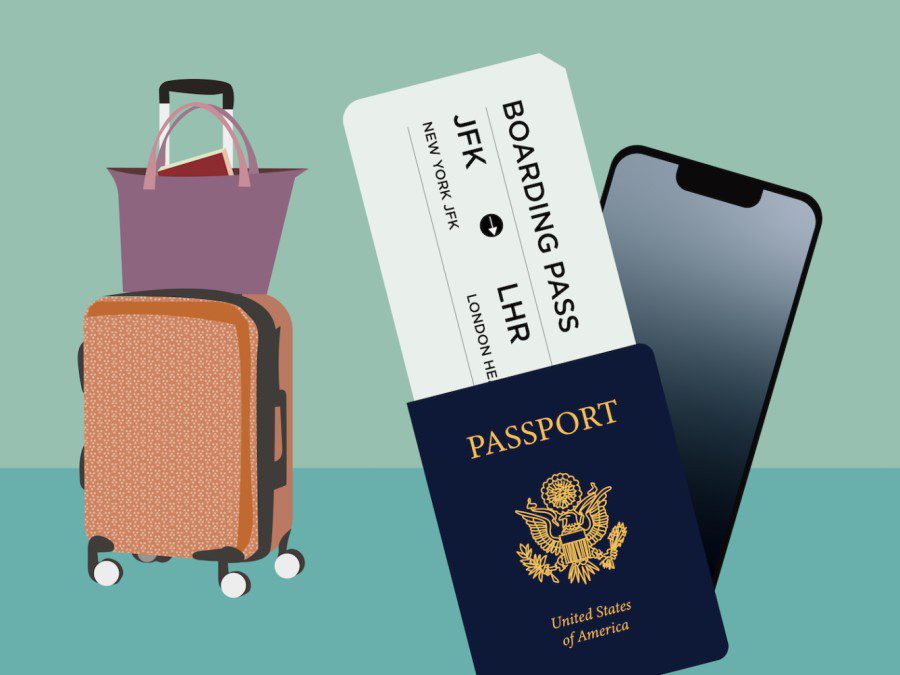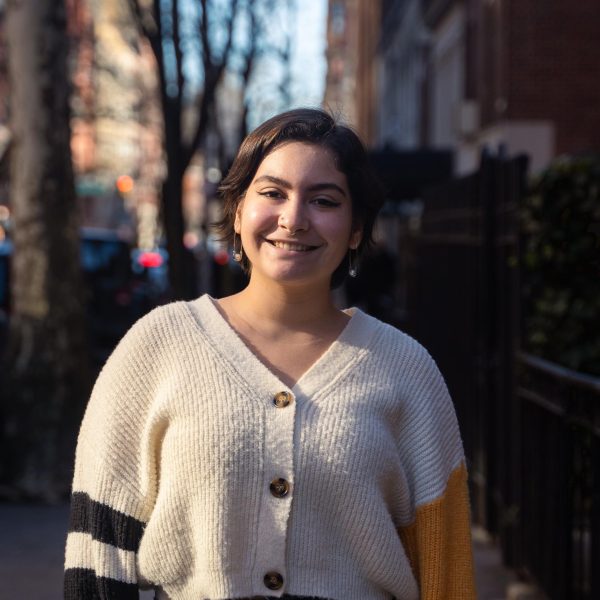Studying abroad next semester? Here’s what to prepare
So, you got accepted to study abroad next semester. Now what? Here’s what you should start thinking about before your semester abroad.
A guide to what to expect after you are accepted to a study abroad program at NYU. (Illustration by Susan Behrends Valenzuela)
October 31, 2022
Congratulations, you’ve gotten accepted to study abroad next semester! However, before the fun starts, there’s a lot of planning to do. Here are some tips and advice on what you should start preparing from the seasoned, self-proclaimed study-abroad experts and Parisian city girls, Juliana Guarracino and Lorraine Olaya.
Olaya: Our credentials? We studied abroad in Paris together and traveled to at most three European cities in the same weekend. Plus, Juliana is currently in Buenos Aires and going back to Paris next semester without me. I hate her.
Guarracino: I love u HAHAHAH ❤️
Visas
Guarracino: This will be the first of many emails you will get from NYU about your semester abroad. I know you’ll have the urge to ignore them, but these are not the ones to leave unread. Read every email thoroughly, and note what you actually need to get done and what deadlines you’ll need to meet. If you are not sure if you will meet a deadline, reach out to Global Programs because some deadlines are not flexible.
Olaya: The visa process was like a fever dream for me. It’s rough and you might not fully understand what you’re doing, but the earlier it gets done, the easier your life will be. Pay attention to those emails, and follow the instructions to a T.
Guarracino: When you do eventually get your visa, make copies and take pictures of it. Not only will that save you if something unfortunate happens to your passport, but it’ll also be helpful for museum visits, payments and other activities that typically require a student identification card.
Olaya: I actually carried around a printed photocopy of my visa in my wallet, and it was such a life saver. I got into so many museums for free or with a discount just because I could show them that I was a student.
Class Schedule
Olaya: When creating your class schedule for studying abroad, try to frontload as many of your classes as possible. It’s convenient to have a three-day weekend every weekend, especially if you want to travel. Making sure that your Thursday nights and Monday mornings are free will also help you make the most of your weekends. You can easily hop on a flight after your last Thursday class, and come back before your first Monday class.
Register for site-specific courses, since you can’t take them anywhere else, as well as classes that won’t be too much work. When you’re abroad, there are many more ways to make better use of your time away from home than stressing over an assignment.
Guarracino: In 10 years, you’ll remember your trip to Amsterdam, not the essay that you bombed because you haphazardly wrote it on the train there.
Olaya: Damn, you’re just calling me out. But, I really do remember our trip to Amsterdam more than that paper I was writing on the train ride there. Plus, for the record, I’m pretty sure I got a B.
Packing
Guarracino: Next semester may seem far off, but it’s never too early to start deciding what to pack. I try to make a list of what I use day-to-day during the weeks leading up to my departure.
Olaya: Having an extensive packing list is crucial if you don’t want to have to buy anything there that you accidentally left at home. In the months leading up to my flight, I’d remember randomly that I should bring some random item like a thermometer or an extra pair of glasses — in case I accidentally broke mine while abroad — and I’d write it down.
Guarracino: While you may want clothes for different climates or occasions, I can assure you that if you haven’t worn that shirt in the past month, you’ll probably never wear it when you’re abroad.
Olaya: Essential items that I’m thankful I didn’t forget to bring were: a portable charger, speaker, a Brita filter water bottle, laundry detergent sheets, painkillers, my Curly Girl hair care products — which are only available in the United States — and an international travel adapter — which saved my life because I didn’t think I’d end up in the United Kingdom and I did. Also, definitely try to pack light. You’re going to buy more than you think you will, and then end up having to pay for an extra suitcase just to take everything back home.
Guarracino: NYU will also tell you not to bring valuables, which is valid, but I think having at least one thing that reminds you of home, be it a blanket or a stuffed animal, will really help you on those days when you’re homesick. This includes snacks and spices too. I always bring a giant bottle of Adobo with me, because I know I won’t find it where I’m going. But, sometimes just bringing a box of Kraft Macaroni & Cheese for midterms week is exactly what you need.
Olaya: When we say disgusting American junk food comes in clutch, it comes in clutch. I am not ashamed to say I forced my friend to bring me an entire suitcase of Kraft Macaroni & Cheese and ten bottles of Poland Spring when they visited me halfway into the semester. European water is gross.
Finances
Guarracino: If you’re lucky, your exchange rate will be very forgiving and cash will be very necessary — I’m looking at you, NYU Buenos Aires — but if not, debit cards are almost always accepted. I always like having some money in the local currency with me when I arrive, because worrying about going to the bank or a Western Union during the orientation week is not the move.
Olaya: Look into what banks are at your study abroad site and see if you can get a debit card with them. Before I went abroad, I found out that Bank of America is a sister bank of BNP Paribas in Paris, which meant that I could withdraw cash at any BNP bank without any ATM fees.
You can exchange currency before you leave, just so you have some cash on hand, but be wary of how much they charge for it. I think Chase Bank charged a fee on top of the exchange rate but withdrawing money while abroad can sometimes be cheaper.
I also applied to get a travel rewards credit card so that I wouldn’t get charged any foreign exchange fees for using my card to pay in local currency. Also, if you’re ever given the choice to pay in USD or local currency, always pay in local currency — it’s typically cheaper.
Travel Plans
Olaya: Start thinking about if you want to arrive earlier to your site or leave later than you’re supposed to — if you can afford it. I arrived in Paris a week earlier than move-in day, and that was the best choice I could’ve made. I was able to familiarize myself with the city and do all the touristy sightseeing before I got busy due to school.
Also, start planning your travel itineraries now. Like this second. Nothing is worse than attempting to slap together a last-minute itinerary at 11 p.m. while you have an entire five-page paper due in an hour, dishes in the sink, an empty stomach and a midterm the next morning.
Guarracino: Traveling can be done on a budget too. So, you may have to take a questionable Ryanair flight and you may get stuck at the Edinburgh airport for a couple of hours — it’s all a part of the journey. Look at your options months ahead of time to gauge what is within your price range and how you should plan. You’d be surprised how far you can get with a cheap 5 a.m. bus ticket.
Olaya: Check your budget ahead of time, and make sure you can afford to go to these places. Start planning potential travel dates. Research plane, bus and train ticket costs, and buy them as early as possible. Juliana and I had to cancel our dream trip to Lisbon because we’re broke and last-minute plane tickets were too expensive.
Research thoroughly where you want to go and what you want to do ahead of time — the tourist sites you can’t miss, good restaurants or local foods to try, hidden gems and types of available transportation. Make full itineraries or lists both for your specific study abroad site and also for the places you intend to travel to outside of your site — if you intend to travel — so you can make the most of your time abroad. TikTok is a good place to look for restaurant recommendations and travel itineraries, but if you’re lazy, Tripadvisor has lists of main tourist attractions not to miss.
Guarracino: Treat it like setting your intentions. Be realistic, but set some goals. Manifest your flight to Vienna now — flights, housing, itineraries and all — so future stressed-because-of-midterms you only has to click “buy.”
Olaya: It can also be helpful to learn how to say “hello,” “please” and “thank you,” in local languages, and to be cautious of how differently transportation may work abroad — especially if you’re trying to visit a more remote location. I had to learn the hard way that Uber doesn’t exist in small, rarely-visited French towns. You have to actually call a taxi cab company, or figure out how buses work with paper maps because Google Maps doesn’t show their public transport.
And if you’re planning to take flights to other locations, consider investing in a huge carry-on backpack or duffle bag that doubles as your personal item. Small airlines will charge you for a carry-on or force you to check in your suitcase. Trust me, you’ll save your wallet and your sanity.
Guarracino: I was carrying my duffle but really, my duffle was carrying me.
– – –
All this planning may not seem as glamorous as actually being abroad, but it’s certainly worth it. It’ll make your life much easier when you get there. Once you have these steps covered, all you have to do is fly there and enjoy being abroad!
Who knows? Maybe you’ll meet a friend and eventually write a travel advice article together based on your adventures.
Contact Juliana Guarracino at [email protected] and Lorraine Olaya at [email protected].


























































































































































